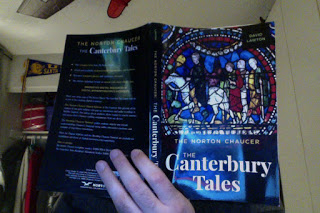Whan That Bonus — Lucas Ranks The Canterbury Tales
That's right, it's that thing I hate where the qualitative is quantified for no discernible purpose. But it is also kinda fun. So here are the rules: this is based solely on my own enjoyment of the extant Canterbury Tales; the General Prologue and Here Taketh the Makere of This Book His Leve are excluded, only portions of the text marked as tales will be considered; prologues count as part of their tale; in the event that I deem two tales to be equally enjoyable there will be a tie; I'll try and come up with a pithy summation of each tale; and of course, we start with the worst: 24) The Prioress's Tale : Basically Blood Libel. This one is just straight-up anti-semitic garbage. It has no redeeming value. It serves no purpose beyond defaming Jews and feeding a Christian persecution complex in spite of the fact that it was written in a country whose Christian king had expelled all Jews more than a century before it was written. It's trash. 23) The Parson's Tale :...






